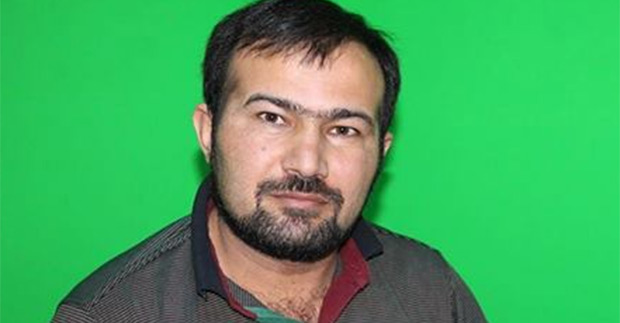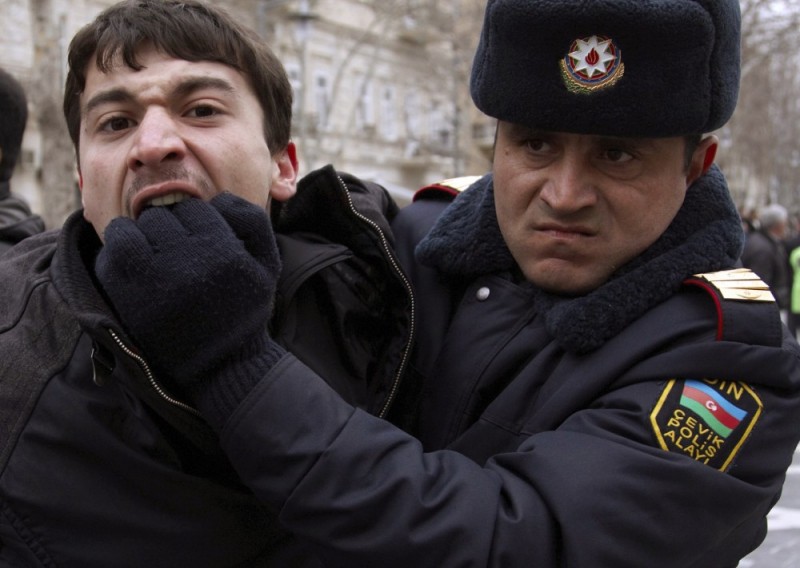16 Aug 2016 | Azerbaijan, Azerbaijan News, Europe and Central Asia, Mapping Media Freedom, mobile, News and features

Azadliq journalist Seymur Hezi was arrested in August 2014. He was subsequently convicted of aggravated hooliganism and sentenced to five years in prison.
Azerbaijan has never had a strong record on press freedom. Since independence, the country’s journalists have been mistreated, while independent and opposition newspapers faced constant libel charges and other harassment from local law enforcement or criminal elements.
Journalists and outlets that support government policies are left alone to fill their pages with praise, while those who take a more critical approach are punished. Official court documents detail how journalists have been sent to prison on trumped-up charges of hooliganism, extortion, trafficking, and instigating mass protests and violence.
In practice, however, targeted journalists reported on official corruption, criticised extravagant government spending or documented illegal evictions. While the country’s leaders and key decision makers pay lip service to media freedom, the government continues to hunt down journalists, activists and human rights defenders.
Periodic waves of arrests have created a sense of fear that has suffocated the country’s journalists. Independent media — like Index award-winning Azadliq — have been pushed into bankruptcy through the withholding of funds and spurious libel litigation. Even media organisations based outside the country — like meydan.tv — have been subject to harassment and punitive investigations. Azerbaijan’s small but remaining mass of independent voices is shrinking.
The timeline, beginning in 2003, includes journalists and bloggers who have been arrested and sentenced on bogus charges.
TimelineJS Embed
28 Jun 2012 | Europe and Central Asia
The Azerbaijani government must resolve the cases of 89 political prisoners and put an end to politically motivated arrests, the Council of Europe (CoE) said on 26 June. The resolution followed the publication of a report on Azerbaijan by Christoph Strässer, the CoE’s Special Rapporteur on political prisoners. The German MP has repeatedly been denied entry to Azerbaijan to report on the situation there. His report states that some individuals had been imprisoned for such lengthy periods that they should be released “even if the verdicts against them, following controversial trials, were deemed to be justified”. Those held on politically motivated charges should either be released or have their cases reassessed in fresh trials.
 Index on Censorship, ARTICLE 19, Human Rights House, Reporters sans Frontières and other members of the International Partnership Group for Azerbaijan (IPGA), have called on Council of Europe Committee Members to taker a tougher stand against President Aliyev and his government, which has repeatedly ignored calls for it to honour its commitments under the European Convention on European Rights. The special rapporteur’s report references IPGA findings and conclusions.
Index on Censorship, ARTICLE 19, Human Rights House, Reporters sans Frontières and other members of the International Partnership Group for Azerbaijan (IPGA), have called on Council of Europe Committee Members to taker a tougher stand against President Aliyev and his government, which has repeatedly ignored calls for it to honour its commitments under the European Convention on European Rights. The special rapporteur’s report references IPGA findings and conclusions.
Currently, there are seven journalists and civil society activists in Azerbaijani jails being held on politically motivated charges or punished for exercising their right to free expression. They include Anar Bayramli, Zaur Guliyev and Vidadi Iskenderov.
Free expression advocates welcomed yesterday’s draft resolution, but also pointed to the continued clampdown against those critical of the government or taking part in protests. Although nine activists were released on 22 June, only the day before, Hilal Mamedov, editor-in-chief of Talysh language newspaper Tolishi Sado was arrested on spurious drugs charges. One activist, youth leader activist Tural Abbasli from from the Musavat Party, has already been issued a summons to begin military service with immediate effect, a move that has been widely regarded as an attempt to limit his political activities.
While the draft resolution had been approved, details of the Azerbaijani authorities’ repeated refusals to allow Special Rapporteur Strässer from entering the country were omitted by committee members prior to its adoption. And the resolution will not come into effect until it secures approval from the Council of Europe’s plenary session in October. Azerbaijani authorities have been known to ignore the Council; and it remains to be seen if the resolution will help end the clampdown that started after the Eurovision Song Contest left town.

14 Jun 2012 | Azerbaijan News, Europe and Central Asia, Index Index, minipost
On the evening of 13 June, Azerbaijani photojournalist Mehman Huseynov was released after being detained the previous day. He was arrested after being accused of insulting policemen and charged with “hooliganism”, a regular tactic used by Azerbaijani authorities to silence critical voices in the country. Huseynov’s arrest, together with the sentencing of Anar Bayramli on 11 June and the arrest of other political activists, has widely been seen as part of a renewed clampdown on freedom of expression following the Eurovision Song Contest on 26 May. The charges against Huseynov remain.
To sign Index on Censorship’s petition to support free expression in Azerbaijan, click here


 Index on Censorship,
Index on Censorship, 